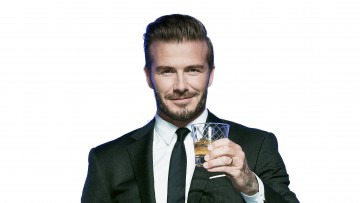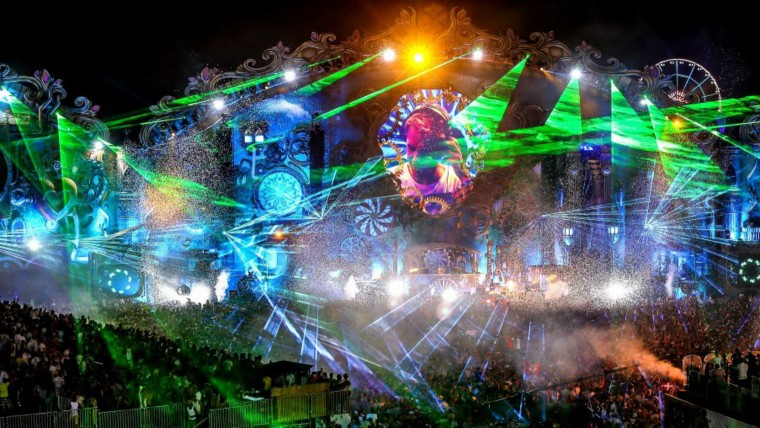Ask David Gates, Diageo’s global head of premium core spirit brands, what is his personal favourite and there is no hesitation.
“Johnnie Walker Black Label with ice and soda is my number one. The product just tastes damn brilliant,” says Mr Gates, who has an emotional, taste and career attachment – he spent five happy years in Brazil marketing the brand.
Then again it can depend on the occasion or time of day. Another favourite, the Isle of Skye malt, Talisker, goes down well after dinner. Before dinner it’s more likely to be Tanqueray gin and tonic or a Smirnoff.
Mr Gates may have to make room in the pantheon of favourite brands he is in charge of for a new creation launched in October. It came in a heavy, opaque blue bottle with the involvement of former footballer David Beckham and his entertainment partner Simon Fuller.
Haig Club is an attempt to address a long-term problem facing whisky in mature markets – the drift from dark to lighter spirits and the difficulty of attracting younger drinkers, particularly women, who see the drink as challenging.
While whisky is growing in the developing world, in the United States and Western Europe, the market has not been “particularly strong” for 30 years.
“We believe there is a real opportunity to revitalise the Scotch whisky category in those quite mature markets, but we need to be quite disruptive to do that. The vision to make whisky the most vibrant category in spirits gave birth to Haig Club,” explains Mr Gates, whose first job was promoting Perrier before spending 24 years at Diageo and its corporate predecessors.
The disruptive “answer” was to use a single-grain spirit, light in colour, flavour and texture, the sort of spirit, which normally goes anonymously to make blended whiskies.
The Gates insight came from programmes teaching consumers about whisky on his international travels, including stints in Japan, Singapore and the Netherlands. Consumers were introduced to Islay malts, such as Lagavulin or Caol Ila, which go into Johnnie Walker blends, and then to single-grain spirit.
Though single grain is not widely available as a separate drink, Mr Gates noticed people absolutely loved it. “It’s slightly sweeter, it’s more approachable, it’s a much easier way to come to whisky,” he says.
When Beckham posted images of himself and Victoria ‘at the launch of my new whisky Haig Club’ on Facebook, there were 200,000 ‘likes’ within 45 minutes, 1.4 million within 12 hours
The Diageo executive also wanted to be “disruptive” about appearance. Whisky bottles appear “samey” in shades of green, brown or beige. The answer was found in the whisky-blending lab in Scotland where “the noses” – the master blenders – use dark opaque blue glasses to avoid being influenced by colour.
“That was the design inspiration. My God those glasses look absolutely beautiful,” recalls Mr Gates. And then while Haig Club was still being developed, along came Beckham and Fuller. Beckham has been building a business career and was interested in working with alcohol in the context of responsible drinking.
Diageo, trying to introduce a “game-changer” to the world of whisky saw Beckham, with his “extraordinary” appeal, particularly in Asia, as the ideal partner.
When Beckham posted images of himself and Victoria “at the launch of my new whisky Haig Club” on Facebook, there were 200,000 “likes” within 45 minutes, 1.4 million within 12 hours.
Mr Gates says Diageo could, and would, have launched its new whisky without a Beckham-like figure, but not at the same speed.
“There is a brand awareness of around 20 per cent which for a product launched just eight months ago is extraordinary,” says Mr Gates, who used a mixture of traditional television and out-of home advertising, combined with Twitter, Facebook and the PR Beckham generated through online and conventional media.
He won’t talk about sales yet, other than to say that Haig Club is ahead of plan. It may not be obligatory to have a celebrity behind a launch, but if you do, the model that works best, the Diageo executive believes, is a continuing partnership rather than a more shallow short-term endorsement.

Diageo used David Beckham to promote their new whiskey, Haig Club
The company has also had success with a Beckham-style relationship with the hip-hop star Sean “Diddy” Combs, formally Puff Daddy, and the relaunch of Ciroc premium vodka. Diddy has even been heard to call himself Ciroc Obama.
“When you have a disruptive model and a disruptive business partnership, we think there is real magic in there,” says Mr Gates, who is nonetheless planning further spirit innovations without deployment of celebrity.
What is not an option is any failure to recognise the fragmentation of media channels over the past decade, and the rise of the social media and the ability to reach dispersed groups of like-minded people, such as fans of Islay whiskies.
As a former rower, he is involved in many online communities devoted to the sport and notes the scale of the positive coverage generated by Newton Asset Management’s sponsorship of the women’s Oxbridge boat race.
“You need to talk to the small groups who love you and you need to speak to the broader audience as well. It’s getting quality and quantity, and that is getting more complicated,” he concedes.
Setting up partnerships with credible people in appropriate genres of music or entertainment is important. Smirnoff has always had a strong footprint in electronic dance music.
So Mr Gates set up a partnership last year with Tomorrowland, the major Belgian music festival, and created a Smirnoff House, something that looked like a suburban house where “the kids” were staging a six-day house party with DJs while the parents were away.
Through the live Tomorrowland TV stream, Mr Gates was able to reach 20 million people globally with Smirnoff, something that would have been very difficult if Diageo had staged its own event.
He recognises the obvious double-edged nature of social media coverage – he has just read Jon Robson’s So You Have Been Publicly Shamed – but believes you can guard against the trolls by demonstrating integrity, transparency and humanity.
“If you do make false claims or do try to manipulate the truth you will be in danger of being exposed in social media very quickly,” says Mr Gates, who adds that Diageo has its own very detailed internal code for how the company’s alcohol products are marketed.

Through a partnership with festival Tomorrowland, Diageo were able to reach 20 million people worldwide
The Diageo executive concedes that “very restrictive legislation” in countries as different as France and Vietnam inevitably make life more difficult, but the company has a “tool box” of marketing strategies to cover the wide range of international regulatory environments.
“Our central view is that used responsibly, alcohol can enhance people’s pleasure and enjoyment in life,” says Mr Gates, who is based in Amsterdam, but regards Putney in south-west London as home.
The internet is not, however, a panacea for marketing single brands, such as Johnny Walker, around the world and Diageo has a four-stage strategy. It runs from basic information for some cities in China, where the drink was unknown, through to countries, such as Greece and Thailand, where the Johnny Walker “Keeping Walking” campaign is well understood, and on to the problems of post-mature markets such as Germany.
For Mr Gates the acceleration of fragmentation and the resulting befuddling choice for consumers will continue.
“But I do think there will be a continuing demand and expectation for transparency, and for premium, quality brands,” he concludes.
In the meantime, he recommends what he and David Beckham call the “signature service” for Haig Club – mixed with ice and sparkling apple juice – a combination that might raise an eyebrow if offered to a traditional malt whisky drinker.
DAVID GATE’S CAREER
Appointed Diageo’s global head of premium core brands in July 2013, he leads the Johnnie Walker, portfolio whisky, rum and tequila, Smirnoff and Captain Morgan brands. He is also chairman of the International Affairs Committee of the Scotch Whisky Association (SWA) and a member of the SWA Council. In his previous role of global category director of whiskies, he was responsible for driving global whisky strategy across Diageo’s largest drinks category portfolio, contributing approximately one third of the group’s total profit. He has also held a number of senior marketing positions within Diageo, including global brand director Johnnie Walker, marketing director spirits, Asia-Pacific, and marketing director, Asia. He has travelled extensively and worked in Brazil, Japan, Singapore and the Netherlands.


